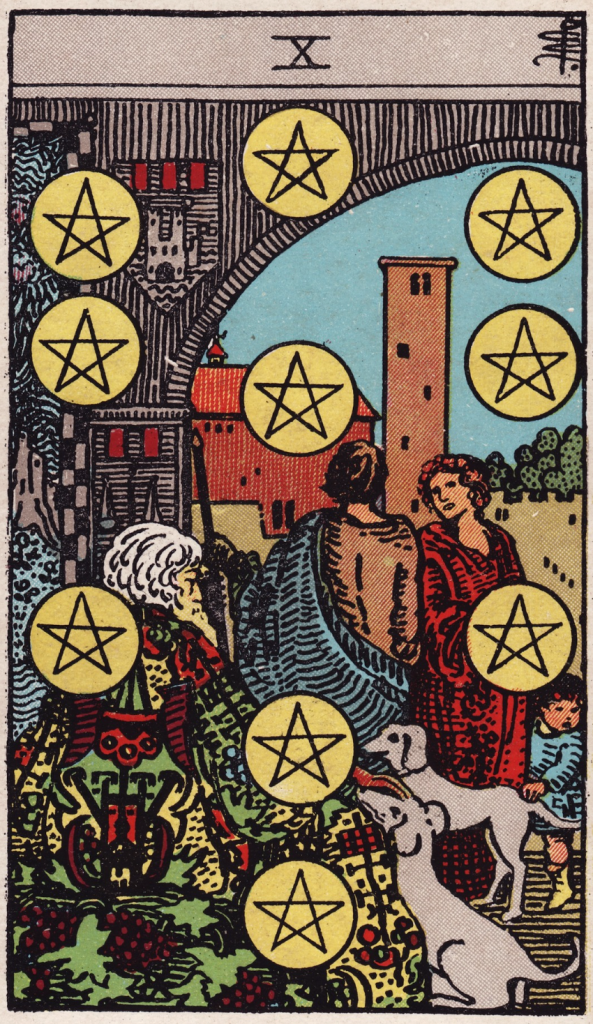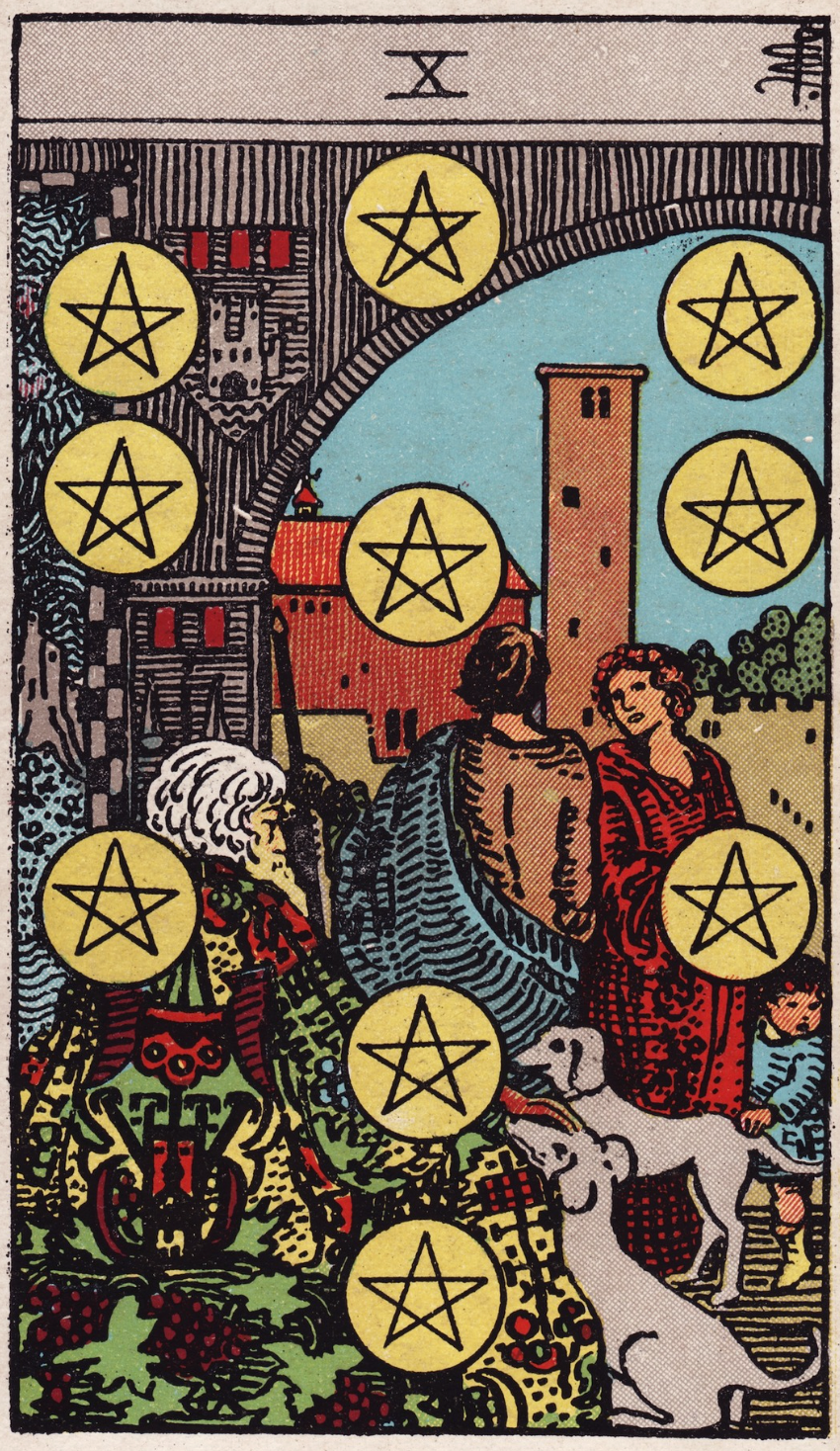
The Ten of Pentacles is the card of legacy, family, solid foundations, stability, tradition, and wealth. In this card, an old man is shown surrounded by his family at his wealthy estate. He is surrounded by his children, his grandchildren, and his dogs. Everyone is playing happily and enjoying each other’s company. This legacy is the fruit of everything this man has worked for in his lifetime.
The Ten of Pentacles reminds us that a strong relationship can build a legacy over time. Eventually, a couple becomes family. Together, they can achieve their goals, whether that is having children or starting a business together. Whatever it is that you want to achieve in life, your relationships with others make your goals meaningful, and you can often do it together. It is no longer about me, but about we.
Upright Meaning:
If the Ten of Pentacles appears in a Tarot spread as a person, that means that this person is associated with wealth, family legacy, and long-term success. This individual often represents the culmination of efforts and achievements that benefit not just themselves, but their family or community as a whole. They are usually seen as a pillar of their family or social circle, embodying the stability and success that comes with hard work and dedication over time.
For physical characteristics, the Ten of Pentacles as a person represents someone who often appears respectable and established, reflecting their stable and affluent background. Their attire and overall appearance may convey wealth and tradition, often favoring classic styles that denote a sense of timelessness and solidity. They might carry themselves with an air of confidence and composure, indicative of their secure position in life.
For emotional characteristics, the Ten of Pentacles as a person represents someone who is focused on family values, legacy, and the continuation of success through generations. They often hold a deep sense of responsibility towards their family or community, valuing the preservation and growth of the legacy they are a part of. This person usually takes great pride in their heritage and is committed to passing on their values and successes to future generations.
Astrologically, the Ten of Pentacles as a person represents someone who is likely influenced by Earth signs, indicating a focus on material security, tradition, and family heritage. These Earth sign influences, potentially from Taurus, Virgo, or Capricorn, contribute to their strong sense of practicality, reliability, and a grounded approach to life. Their astrological chart may feature placements that emphasize stability, tradition, and a long-term view of wealth and success.
For careers, the Ten of Pentacles can represent someone who works in family businesses, finance, or any field where wealth and tradition play a significant role. They are often involved in professions that enable them to build and preserve wealth, not just for themselves but for others connected to them. Their career choices are likely influenced by a desire to maintain and grow the family’s assets or to contribute to the stability and prosperity of their community.
The Ten of Pentacles as a person represents someone who makes you feel the significance of family heritage, long-term planning, and the value of established traditions. Their presence often inspires a sense of respect for the past and a commitment to the future. Engaging with this individual can be a powerful reminder of the importance of building a lasting legacy and the role that each person plays in contributing to the continuity of family and community traditions.
Reversed Meaning:
If the Ten of Pentacles reversed appears in a Tarot spread as a person, that means that this person is experiencing family discord, financial issues, or challenges with legacy. This reversal indicates a disruption in the stability and security that the upright card represents. The individual might be facing conflicts that threaten the foundations of their family or financial situation, leading to a sense of uncertainty or instability.
For physical characteristics, the Ten of Pentacles reversed as a person represents someone who may appear stressed or burdened, possibly reflecting family or financial troubles. Their appearance might convey a sense of worry or exhaustion, possibly due to the strains and pressures they are experiencing. The usual confidence and composure associated with the Ten of Pentacles might be replaced by a look of concern or distraction.
For emotional characteristics, the Ten of Pentacles reversed as a person represents someone who is dealing with familial disputes, inheritance issues, or feeling disconnected from their heritage. They might feel overwhelmed by the weight of family expectations or financial responsibilities. This person could be struggling with feelings of inadequacy or frustration, particularly in relation to their role within the family or their ability to maintain or grow the family legacy.
Astrologically, the Ten of Pentacles reversed as a person represents someone who is grappling with the negative aspects of Earth signs, such as material greed, family conflict, or a breakdown in tradition. These challenges might be reflected in difficult aspects in their Taurus, Virgo, or Capricorn placements, leading to a struggle with maintaining the balance between material wealth and personal or family harmony. The reversed card suggests a need to address and resolve these issues to restore stability.
For careers, the Ten of Pentacles reversed can represent someone who works in a field where family or financial issues are causing stress or discord. They may be in a profession that is heavily influenced by family dynamics, or they might be facing challenges in managing or preserving wealth within their business. This career situation reflects the broader themes of instability and conflict indicated by the card’s reversal.
The Ten of Pentacles reversed as a person represents someone who makes you feel the need to address family dynamics, reassess financial plans, and rethink what true wealth means. Their situation serves as a cautionary reminder that material wealth and success are not immune to problems and conflicts. Engaging with this individual can inspire a reevaluation of one’s priorities, emphasizing the importance of harmony and balance in both family and financial matters.
